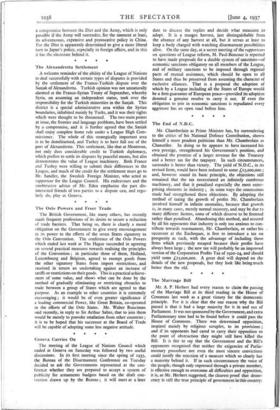The End of N.D.C.
Mr. Chamberlain as Prime Minister has, by surrendering to the critics of his National Defence Contribution, shown himself a more prudent politician than Mr. Chamberlain as Chancellor. In doing so he appears to have increased his own prestige, strengthened his Government's position, and obtained the promise of a larger revenue for the Treasury and a better tax for the taxpayer. In such circumstances, surrender is better than victory. The yield of N.D.C., in its revised form, would have been reduced to some kr5,000,000 ; and, however sound its basic principle, the objections still remained that the tax necessitated an infinitely cumbrous machinery, and that it penalised especially the most enter- prising elements in industry ; in some ways the concessions made had strengthened these objections. By adopting the method of taxing the growth of profits Mr. Chamberlain involved himself in infinite anomalies, because that growth is, in many cases, merely normal recovery, and may be due t3 many different factors, some of which deserve to be fostered rather than penalised. Abandoning this method, and assured by all his opponents that industry is only too anxious to con- tribute towards rearmament, Mr. Chamberlain, or rather his successor at the Exchequer, is free to introduce a tax on prosperity as such, with the advantage of including those firms which previously escaped because their profits have always been large ; the new tax will probably be an improved version of the Corporation Profits Tax of 192o-24, and should yield some £25,000,000. A great deal will depend on the details of the new proposals, but they look like being much better than the old.
* * * *










































 Previous page
Previous page